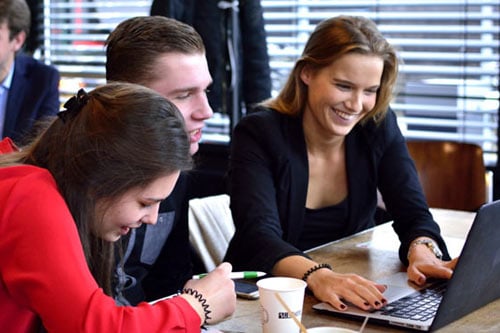In the Sneakers Start-up simulation, teams of students manage a start-up company trading in sports shoes. Here, they need to conduct analyses and hone their entrepreneurial skills, to design and launch their sneakers company's growth strategy. Competing in a series of rounds, students then need to monitor company performance against their KPIs and overall objectives, make strategic decisions and respond to external events to improve their company's performance and earn points on the simulation's ‘Balanced Scorecard’.
Once students have assigned their roles, it's time to design their growth strategy. Based on their internal and external analysis, students need to determine their product's competitive focus: cost leadership, product leadership, customer Intimacy, or a combination of all three.
They also need to set their own SMART objectives and KPIs deciding where to invest within the business to ensure these are on-track and eventually met or exceeded. Within this, they need to decide how risky their objectives are. The level of risk applied to their objectives (and whether they're met or not) are key factors in earning points on the 'Balanced Scorecard' during each round of the simulation.
The Sneakers Start-up simulation is usually assessed in several ways. Below you will find the most popular options:
“I really liked how the simulation worked. It was customisable for a particular topic based on venture creation which involved students running a start-up company.”
| Features | |
|---|---|
| Student levels: | 2nd and 3rd year UG, PG, MSc, MBA |
| Module subjects: | Entrepreneurship, management, decision making and HRM |
| Language: | English   |
In a business simulation theoretical models are put into practice. They provide participants with a unique experience in which team-working, analytical thinking and insight, and decision-making skills are trained and tested throughout each round, enabling student-led and experiential learning.
Register for exclusive offers, industry and new product updates, as well as our tips for great e-learning experiences for your students.
.png?length=300&name=unnamed%20(11).png)
.png?length=300&name=unnamed%20(7).png)
.png?length=300&name=unnamed%20(8).png)
.png?length=300&name=unnamed%20(6).png)

.png?length=300&name=unnamed%20(10).png)
.png?length=300&name=unnamed%20(5).png)
.png?length=300&name=unnamed%20(9).png)
.png?length=300&name=unnamed%20(4).png)
.png?length=300&name=unnamed%20(2).png)
.png?length=300&name=unnamed%20(1).png)
.png?length=300&name=unnamed%20(3).png)
.jpg?length=300&name=unnamed%20(2).jpg)





.png?length=300&name=loughborough-university-logo%20(small).png)


 Management simulation
Management simulation Edubook
Edubook
application recieved
We have received your question and we will return to you within 24 hours on workdays.